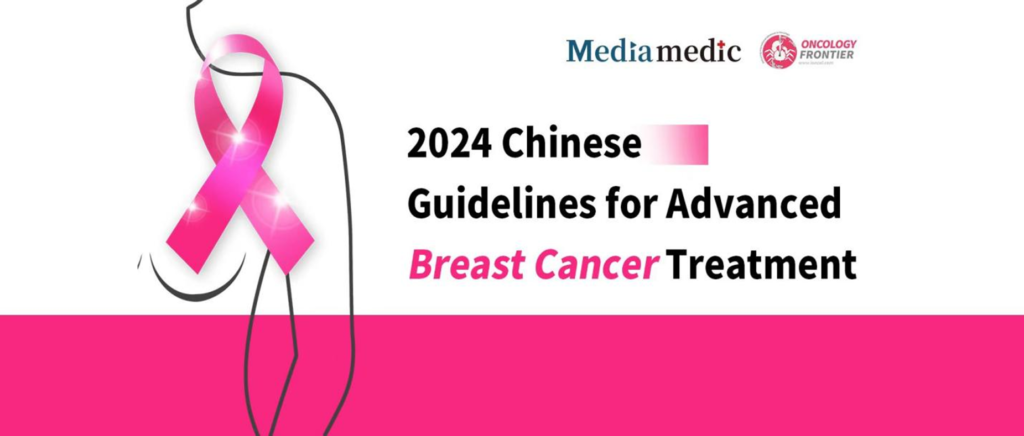
Editor's Note: At the 2024 Breast Cancer Standardized Diagnosis and Treatment & Quality Control Conference (November 8–10, Beijing), Dr. Ying Fan from the Cancer Hospital Chinese Academy of Medical Sciences, presented the key updates to the 2024 Chinese Advanced Breast Cancer Clinical Guidelines (ABCC). The updated ABCC guidelines include treatment recommendations for different breast cancer subtypes and introduce a new chapter on managing adverse events. Below is a summary of the key updates to the guidelines.Global and National Context
Since 2012, the biannual ABC International Consensus Conference, hosted by ESO-ESMO, has established authoritative international guidelines for advanced breast cancer management. In parallel, the Chinese Advanced Breast Cancer Clinical Guidelines (ABCC), launched in 2014, have significantly advanced the standardization of advanced breast cancer treatment in China. These guidelines, published in international journals such as Cancer, share China’s experience and solutions with the global oncology community.
The 2024 ABCC guidelines incorporate the latest evidence-based medicine, addressing 30 key issues in advanced breast cancer diagnosis and treatment, informed by the votes of 51 experts. Key updates include the following:
1. Principles of Advanced Breast Cancer Treatment
Two major updates were made to the general principles of treatment:
- Emphasis on Biomarkers: The guidelines recommend identifying biomarkers such as ESR1, PIK3CA, AKT, PTEN, PD-L1, gBRCA, MSI, and TMB, whenever clinically available, to guide therapy.
- Long-Term Remission and “Therapeutic Holidays”: Building on insights from ABC7, the guidelines introduce therapeutic holidays as an option for patients achieving long-term remission. Decisions should be individualized, as there is no definitive evidence for the duration of remission or holiday periods, with regular follow-up required.
2. HR+/HER2- Advanced Breast Cancer
The 2024 guidelines recommend several updates to treatment strategies for hormone receptor-positive, HER2-negative advanced breast cancer:
- First-Line Therapy: Based on the INAVO120 study, fulvestrant + palbociclib + inavolisib is now an option for patients with primary endocrine resistance and PIK3CA mutations.
- Second-Line and Beyond: Updates include: HER2-Low Patients: T-DXd is prioritized based on DB-04 and DB-06 studies. PIK3CA/AKT2/PTEN Mutations: Fulvestrant + capivasertib is recommended based on the CAPItello-291 study. TROPiCS-02 Study: Sacituzumab govitecan is an option. TROPION-Breast01 and EMERALD Studies: Dato-DXd and elacestrant (for ESR1 mutations) are additional options.
The guidelines categorize treatment strategies based on the PAM pathway inhibitors, HDAC inhibitors, antibody-drug conjugates (ADCs), and next-generation SERDs, adjusting recommendations according to evidence quality and drug availability in China.
Regarding ADC treatment, there is limited data on the optimal sequence of ADCs. Clinical trial data suggest that T-DXd may be used earlier than sacituzumab govitecan, as supported by DB-06 and TROPiCS-02 studies.
3. HER2+ Advanced Breast Cancer
Key updates for HER2-positive advanced breast cancer include:
- First-Line Therapy: The addition of the PyTH regimen (pyrotinib + trastuzumab + taxanes) based on the PHILA study.
- Second-Line and Beyond: T-DXd is now prioritized in the IA category, reflecting its improved availability in China.
For patients who fail adjuvant T-DM1 intensification after HER2-positive neoadjuvant therapy (non-pCR), there remains considerable clinical debate. In the 2024 expert votes, the top-recommended regimens for first-line therapy include:
- PyTH (41.19%),
- T-DXd (37.25%), and
- Pyrotinib + chemotherapy (19.61%).
4. Triple-Negative Breast Cancer (TNBC)
- First-Line Therapy: Based on KEYNOTE-355 and TORCHLIGHT studies, PD-L1-positive patients should receive immune checkpoint inhibitors (ICIs) combined with chemotherapy.
- Second-Line and Beyond: Trop-2 ADC drugs such as SKB264 and sacituzumab govitecan are now recommended based on OptiTROP-Breast01 and ASCENT studies.
For HER2-low TNBC patients who progress after 1–2 lines of chemotherapy, both sacituzumab govitecan and T-DXd are viable options, with nearly equal preference in the 2024 expert votes (T-DXd: 52.94%, SG: 45.1%).
5. Additional Updates
Brain Metastases
For HER2-positive asymptomatic brain metastases, the guidelines recommend deferring radiotherapy while closely monitoring with CNS-active anti-HER2 therapies.
The guidelines also update systemic treatments for brain metastases, including:
- PERMEATE Study: Pyrotinib + capecitabine.
- BROPTIM Study: Pyrotinib and capecitabine + radiotherapy vs. radiotherapy alone.
- HER2CLIMB-02 Study: T-DM1 + tucatinib vs. T-DM1 + placebo.
- ZN-A-1041-101 Study: ZN-1041 + capecitabine + trastuzumab.
- DB-12 Study: Latest data on T-DXd.
Supportive Care
The guidelines now emphasize patient-reported outcomes (PROs) with the establishment of a China-specific NCC-BC-A scale, launched in February 2023. This scale promotes patient-centered care in advanced breast cancer management.
Adverse Event Management
A new chapter addresses managing adverse events associated with emerging drugs such as PAM pathway inhibitors, small-molecule TKIs, ADCs, and ICIs.
Other Topics
The guidelines include expert votes and insights on several controversial topics, including:
- Surgery for initial stage IV oligometastatic breast cancer.
- Defining endocrine insensitivity.
- Maintenance therapy for different breast cancer subtypes.
- Sequential ADC therapy.
- Trop-2 and HER2-low expression detection.
- Management of hereditary breast cancer.
The 2024 ABCC guidelines provide clinicians with updated evidence-based recommendations and aim to further standardize advanced breast cancer management in China while sharing its unique experiences with the global oncology community.


